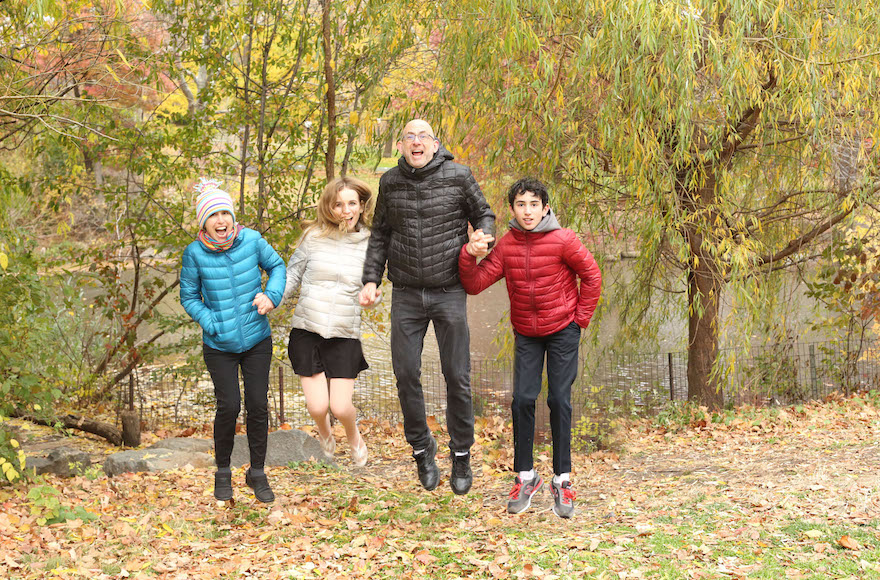At Hanukkah, finding light in a time of illness and darkness
Published December 16, 2016

Elicia Brown, left, and her family in November 2016. (Jennifer Bowles)
NEW YORK (JTA) — It is the “the witching hour,” around 4:30 p.m., when darkness descends swiftly on the streets of New York, and exhausted children and their parents tend to quarrel.
ADVERTISEMENT
But my son Joel, now 12, is full of good cheer. He keeps a steady bounce in his step. He smiles into the wind.
“The black sky at this early hour,” Joel explains, his tall frame swaying in sync with his springing step, “means that the Hanukkah lights will be coming soon.”
For a parent, it is a sweet moment like so many others: My adolescent boy, 5-foot-7 and prone to irony, still delights in the simplest pleasures of the world around him. What’s more, we share the same feeling about Hanukkah, that it punctuates and brightens what would otherwise be December’s darkest, shortest days.
For a cancer patient like me, the moment means even more. For this evening, I, too, can keep a bounce in my step. The chemo drugs haven’t, for the time being, zapped my energy, or stiffened my back, or thrown my digestive track off kilter. I exult in my own personal miracle of light.
If there’s any blessing in sickness, it’s the greater awareness one brings to the bright moments in life, which can be as mundane as listening to the sound of wind whistling through a tree’s bare branches or as profound as witnessing your daughter’s graduation from middle school.
ADVERTISEMENT
When I stand under a steaming hot shower, and the pressure and warmth wash away physical distress, I am grateful almost to the point of bliss. I am similarly uplifted when a pain reliever allows me to sit in a desk chair and type these words, and when the howling pain that gripped my stomach all morning has quieted to a distant grumble.
People often tell me that I’m brave to face a diagnosis of ovarian cancer without sinking into despair. But I’m not a particularly courageous person. As Oliver Sacks, the author and neurologist who died last year, wrote, “I can’t pretend I’m without fear. But my predominant feeling is one of gratitude.”
I’m lucky to be under the care of a top oncologist who remains optimistic about my plight. I’m lucky to be the beneficiary of a support system that includes a fan club of friends, my ready-to-drop-anything parents and a superhero husband — in the guise of a balding, bearded Jewish dad who is capable of rescuing, in a single bound, a teenager confused by biology homework, a child needing to be picked up from basketball and an ailing wife. Meanwhile, of course, he’s preparing dinner, cleaning dishes and, not incidentally, working as a lawyer.
Yet I’m also lucky in another way: Like others “living with cancer” or some other chronic illness, I have a deeper appreciation of the present moment and a stronger grasp how one’s world can flip upside down without warning. So while I plod through the darkness of sickness, I am also illuminated by the expected and unexpected marvels of everyday.
The Hanukkah story invokes the joy and hope that light can offer us in difficult times. The “miracle of light” — that a single vessel should contain enough oil to burn for eight nights — signifies the Jews’ ability to endure amid adversity. To reflect upon the “miracles of light” in our own lives helps us cope when hardships strike. The practice helps us remain strong in situations where we lack much control, whether we’re confronting a personal tragedy or an unprecedented challenge in the larger world.
I used to be a fervent reader of parenting blogs. I was especially drawn to tales that seemed most tragic — a bereaved mom bringing up a baby without her spouse; parents raising a child with multiple cognitive disorders; a mom dealing with a grave diagnosis of cancer. I remember sobbing while I read the story about this last mom, of how her life transformed in one day. She had been stressed about mortgage bills and college tuitions, about getting everyone out the door on time, about ambitions for both career and family, when suddenly — bang. Cancer knocked at her door, and she never looked back at the frustrations of the old life. She entered a foreign land — that of the sick.
In reality, the lands of the sick and the healthy aren’t as far apart as I once imagined. Paul Cowen, author of “An Orphan in History,” about finding Judaism, was diagnosed with leukemia just before his 47th birthday.
“Until that day, I had assumed that health and sickness were separate, distinct terrains,” he wrote in the Village Voice. “I’ve since learned that those boundaries don’t really exist. Instead the world is composed of the sick and the not-yet sick.”
While that is a sobering concept, I’m more surprised by how my new world continues to resemble my old one. I’m still impatient when a child chatters on incessantly about the magic of chromosomes because, well, it’s 8:30 p.m. and it’s me-time. I am still infuriated when one child, teasing, pretends to snap an unflattering iPhone picture of her brother. I am still bogged down by irritations and insecurities.
But I also celebrate. The many small graces of life loom larger and brighter. I sing the body electrified by winter sunshine. I honor last week’s memory of running in Riverside Park. I rejoice over the thought of wrapping myself in the warmth of family and friends when we kindle the lights of Hanukkah.
(Elicia Brown is a writer living in Manhattan.)















